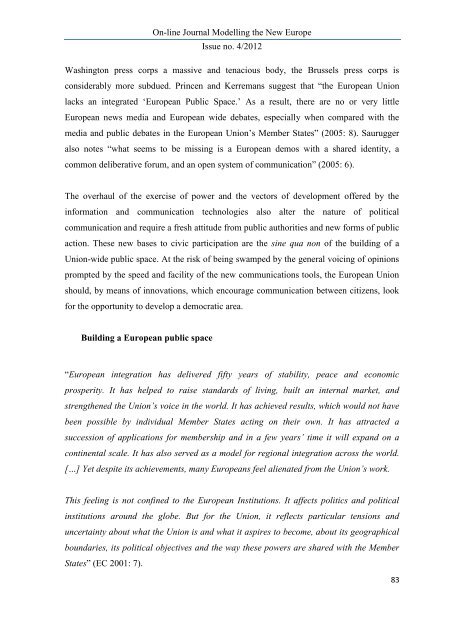On-line journal no. 4 – July 2012 - Modelling the New Europe
On-line journal no. 4 – July 2012 - Modelling the New Europe
On-line journal no. 4 – July 2012 - Modelling the New Europe
Create successful ePaper yourself
Turn your PDF publications into a flip-book with our unique Google optimized e-Paper software.
<strong>On</strong>-<strong>line</strong> Journal <strong>Modelling</strong> <strong>the</strong> <strong>New</strong> <strong>Europe</strong><br />
Issue <strong>no</strong>. 4/<strong>2012</strong><br />
Washington press corps a massive and tenacious body, <strong>the</strong> Brussels press corps is<br />
considerably more subdued. Princen and Kerremans suggest that “<strong>the</strong> <strong>Europe</strong>an Union<br />
lacks an integrated ‘<strong>Europe</strong>an Public Space.’ As a result, <strong>the</strong>re are <strong>no</strong> or very little<br />
<strong>Europe</strong>an news media and <strong>Europe</strong>an wide debates, especially when compared with <strong>the</strong><br />
media and public debates in <strong>the</strong> <strong>Europe</strong>an Union’s Member States” (2005: 8). Saurugger<br />
also <strong>no</strong>tes “what seems to be missing is a <strong>Europe</strong>an demos with a shared identity, a<br />
common deliberative forum, and an open system of communication” (2005: 6).<br />
The overhaul of <strong>the</strong> exercise of power and <strong>the</strong> vectors of development offered by <strong>the</strong><br />
information and communication tech<strong>no</strong>logies also alter <strong>the</strong> nature of political<br />
communication and require a fresh attitude from public authorities and new forms of public<br />
action. These new bases to civic participation are <strong>the</strong> sine qua <strong>no</strong>n of <strong>the</strong> building of a<br />
Union-wide public space. At <strong>the</strong> risk of being swamped by <strong>the</strong> general voicing of opinions<br />
prompted by <strong>the</strong> speed and facility of <strong>the</strong> new communications tools, <strong>the</strong> <strong>Europe</strong>an Union<br />
should, by means of in<strong>no</strong>vations, which encourage communication between citizens, look<br />
for <strong>the</strong> opportunity to develop a democratic area.<br />
Building a <strong>Europe</strong>an public space<br />
“<strong>Europe</strong>an integration has delivered fifty years of stability, peace and eco<strong>no</strong>mic<br />
prosperity. It has helped to raise standards of living, built an internal market, and<br />
streng<strong>the</strong>ned <strong>the</strong> Union’s voice in <strong>the</strong> world. It has achieved results, which would <strong>no</strong>t have<br />
been possible by individual Member States acting on <strong>the</strong>ir own. It has attracted a<br />
succession of applications for membership and in a few years’ time it will expand on a<br />
continental scale. It has also served as a model for regional integration across <strong>the</strong> world.<br />
[…] Yet despite its achievements, many <strong>Europe</strong>ans feel alienated from <strong>the</strong> Union’s work.<br />
This feeling is <strong>no</strong>t confined to <strong>the</strong> <strong>Europe</strong>an Institutions. It affects politics and political<br />
institutions around <strong>the</strong> globe. But for <strong>the</strong> Union, it reflects particular tensions and<br />
uncertainty about what <strong>the</strong> Union is and what it aspires to become, about its geographical<br />
boundaries, its political objectives and <strong>the</strong> way <strong>the</strong>se powers are shared with <strong>the</strong> Member<br />
States” (EC 2001: 7).<br />
83


